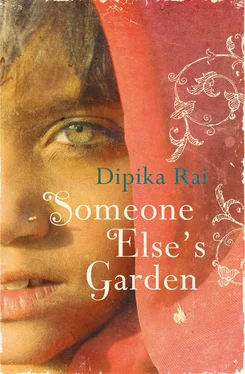The mobile clinics not only bring polio drops for the children but birth control pills and IUDs for the women. Though the women know not to couple in the middle of their cycle, because that is the most blessed time, no one understands the nature of pills. To take one every night to stop a baby from happening sounds too much like magic. IUDs they accept, but it is a brave woman who has an IUD inserted without the knowledge of her husband. Recently the van brought Nirodh condoms. Nirodh, the sheath to a happy life , that’s what the advertisement says, that is what Lata Bai believes.
‘My husband refuses. He says . . .’ she lowers her voice and cups her hand to her mouth, pouring her words directly into the older, more experienced, woman’s ears, ‘he says it isn’t natural that there should be something between a man and woman when they are, they are . . . you know what. It’s not satisfying, like smelling the smoke from another’s hookah.’ She raises her voice back up again: ‘He has a third ear that hears those thoughts before I have them. Look at me, a new baby only weeks old, and I am marrying off my first daughter. My second daughter has children older than mine. Now what’s the sense in that? Weren’t six children enough? I think it’s because we have no other form of entertainment, but to, to . . .’
‘Is it that? Or is it because our religion demands it?’
‘When it suits us, we follow the letter of our religion. We all aspire to emulate the myths, should we all have a hundred sons, just like the Kaurav clan then?’
‘I agree with you, Lata Bai, but someone has to think about such things to want to change them. I was lucky I only had sons, three sons, and then my husband died. That Seeta Ram of yours sees his friends having one child after another. He thinks, more children . . . more hands to work the fields . . . a better crop, he doesn’t see them as mouths to feed. What do you expect from that husband of yours, then?’
‘Nothing, I suppose,’ says Lata Bai, suddenly realising that her husband is a weak man, whose inaction will continue to cost her dearly, just as it did when she first married him and was repeatedly raped by his father. But in fact Lata Bai is wrong, Seeta Ram is not just a weak man, he is a cruel man; a cruel man whose brutality isn’t deliberate, but stems from something as innocuous as an unquestioning nature. And therefore it is the worst kind of cruelty, that can’t be shut off at will. Where the wind blows, Seeta Ram will follow. He will never be one to change anything.
‘Still, Lata Bai, if you really look at it, seven children in twenty years is nothing. You have to consider yourself lucky that you aren’t like your Seeta Ram’s cousin’s wife, married fifteen years with fourteen children to show for it, five of them already dead, one stupid in the head and one not able to walk. At least yours are healthy.’
‘Yes, I suppose they are healthy, for the most part. Though Mamta’s hair has been getting more orange these last few months, and Sneha’s getting that big belly on her matchstick legs.’
‘Oho, come now, now’s not the time to talk of this,’ says Kamla, putting an arm around her friend’s despondent shoulders.
But Lata Bai is a train, off and running. ‘No, she should know how to protect herself.’ She shakes with humourless laughter. ‘What protection can there be against a man who wants to couple? Eh, daughter, if after sex you start itching down there, make sure you wash with lemon juice and neem tea. But if you start making pimples and fainting, then you have to find some government doctor man to help you – that’s if your husband will allow you to go to one. The pimpling disease has no cure, though you can try Asmara Didi’s prescription – drinking your own piss.’
Mamta listens intently while pretending not to, gelled solid by equal parts embarrassment and fear.
‘Lata Bai! Does she have to know all this?’
‘Yes! Yes, she does. I am her only defence. You know how it was with poor Lalita.’ All the women of Gopalpur are familiar with Lalita’s story, though the men hardly discuss it at all. ‘Now you listen to me, Mamta: it’s our place to accept, and accept . . . be demure. Don’t say anything till addressed, don’t make a sound, don’t do anything to make him beat you, because you’ll only have yourself to blame for it. If you displease him, he will beat you. And if you do something really bad, then he might hold you over the stove and start by singeing the hair from your eyebrows, and after that, it’s burning to death and a hasty burial. You remember how Lalita turned up at the well, looking like a boiled egg.’ Even now the memory of that day makes the two older women shudder. An impertinent wind had blown Lalita’s pallav off her burned dome, and they had put their hands to their lips and laughed out loud. Lata Bai and Kamla couldn’t stop even when the poor creature was far away, a tiny speck chased by laughter. She had left her pots behind, and they never thought to return them.
‘Poor Lalita, her husband gave her the disease and then denied her the medicine. And finally, he burned her to death so he could have a cleaner, healthier wife,’ says Kamla. ‘Yes, you better listen sharp to your mother. No one will be able to interfere or help you if you get in trouble. But enough now, Lata Bai, we have shared enough secrets. Let’s talk about something else. Tell me, what about that Ragini of yours? Lucky girl.’
‘Yes, she is blessed,’ says Lata Bai, her words heavy with pride. Lata Bai never worried about Ragini. Golden Ragini, blessed with beauty so unassailable that it was impossible not to be awed by it. Mamta took care of Ragini like her very own child, and at fifteen Ragini was married and gone before her elder sister got even one offer of marriage.
The groom’s family had approached her. He was a gentle soul, with no ambition. One look into his face and Lata Bai knew his type instantly. He would be ruled by Ragini. Seeta Ram sold the family cow for the wedding. He’d insisted on a grand wedding because Ragini’s in-laws seemed so rich and refined. For years Lata Bai dreaded seeing her daughter returned to her scarred and burned because she didn’t bring in enough dowry.
But Lata Bai doesn’t have to worry any more. Her daughter’s position in her new home is secure with the birth of her children: two sets of male twins, little darling children, with large dancing eyes like rabbits, all bright and black with kohl. Of course she would have produced only boys. Golden Ragini.
‘Even the mother-in-law, who thinks she’s spoilt, can’t touch one hair on her head.’ Lata Bai laughs silently inside. ‘Bless you, Ragini,’ she says, ‘bless you. Live, my child, like I never did. No, I don’t worry about her at all. She is loved by all those who know her.’
‘I’ve heard that. She is loved by too many, in fact. She should be careful. Thoo, thoo, thoo, thoo,’ Kamla spits into the four directions to ward off any evil spirits who might be hovering, waiting to ruin Ragini’s future. ‘Stop that! Running your hands through the bucket like a thief through gold! How can I pattern your hands if your whole palm is red?’ says Kamla. But it is too late. It’s good henna. Sneha’s hands are already a strong orange. Kamla laughs and puts them on her cheeks.
‘Yellow hands already, and still so young,’ says Lata Bai with a tear in her voice.
The women sing. Mamta is quiet. Kamla dances, her hips strangely agile for her age and her widowhood. Lata Bai feels very much that she is losing a part of herself, something that should have been cut from her a long time ago. But she has grown so attached to her eldest that she doesn’t know how she’ll survive without her.
‘I am the fruit on your vine, craving water from your hand. Why do I let you go, my innocent one? I am the dove in your cage, cooing for your attention, Why do I let you go, my innocent one? When your palanquin departs there will be emptiness . . .’
Читать дальше












